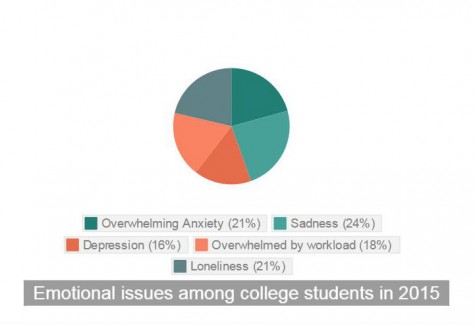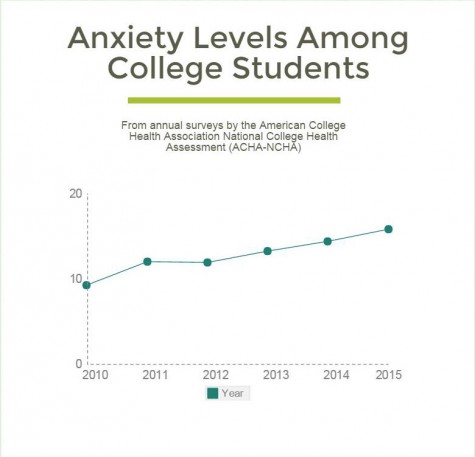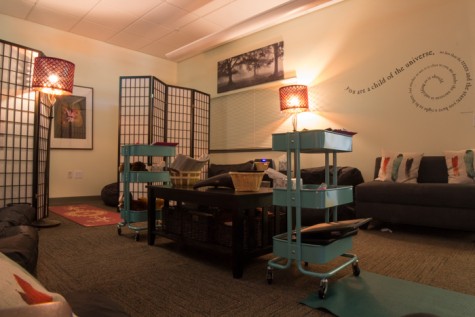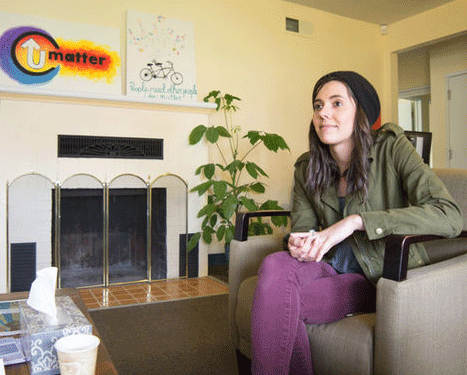Student volunteers and mental health professionals alike have taken on the challenge of raising awareness, reducing stigmas surrounding the idea of getting help for anxiety and convincing Chico State students to join the conversation. The first step has been to make students aware that anxiety is all around, and its normal.
“In general, spring semester always feels more anxious, because we don’t have as long of a break as we do in the summer, and people are getting ready to graduate,” said Jasmine Buck, graduate student in the Marriage and Family Therapy Program, and member of the student outreach group UMatter. “So, in general, I would say, from my perspective, it’s usually higher in the spring.”
UMatter is the student outreach branch of the Health and Wellness Center, and for the past four years they have been holding events on campus. Students can keep up with their events through their Facebook page, Instagram or on Twitter.
“The counseling center sees individual students for their issues, UMatter takes a more global look at mental health on campus, and tries to raise awareness of these issues, to decrease stigma, because that is very prevalent,” Buck said. “Since UMatter has been around there have been a ton more students going to the Health and Wellness Center to the point where they had to change their appointment structure so that they could see more students and make it more efficient.”

True to form, the Health and Wellness Center on campus has seen their share of students dealing with anxiety this semester.
“(The amount of) students feeling more worried or anxious on campus has increased,” said Devjani “Juni” Banerjee-Stevens, the clinical director/associate director of the Health and Wellness Center.
In the last 10 years nationwide there has been a marked increase in student anxiety. While there does not seem to be one unifying factor, experts in the field are advancing their theories about the cause of the steadily rising anxiety.
“All of my colleagues in the field, we’re trying to figure it out. Financial pressure is huge and relationships are the other big issue,” Banerjee-Stevens said.

The difficulty with pinning down a systemic cause for anxiety is that cases vary greatly from person to person. It can sometimes be hard for even the person to describe what they are feeling, so expert opinions vary as well.
“I have my own hypothesis, your generation grew up during a recession, in a period of scarcity, also in a period of more testing and pressure,” she said.
Students do not need to deal with anxiety alone. The Health and Wellness Center is home to a massage chair. Anyone can sign-in and get a massage between classes. This is a quick and easy, low commitment way to reduce stress.
“I hope it doesn’t stay a secret,” Banerjee-Stevens said.
The Health and Wellness Center is located in the Student Services Center, Room 430. In the same office there is a quiet, dimly lit relaxation area called the “Zen Den.”

“It’s a place for people to come and calm down privately,” said Claire Rankin, senior communication major. “Sometimes you don’t really need to talk to a counselor. Counseling is great, but sometimes you just need to…chill.”
The “Zen Den” is a new addition to the Health and Wellness Center, having been installed this academic year.
“The Zen Den came about kind of organically. Umatter used to be in that space, but we were able to get them a bigger space… We’re hoping to eventually have rooms like this in more buildings on campus,” said Banerjee-Stevens.
These are both options for students who want to reduce stress, but aren’t interested in talking to someone. For students who want to talk, there are one-on-one counselling sessions at the Health and Wellness Center.
These are not strictly for people struggling with mental illness. They can be an invaluable resource for managing personal issues, family issues, dealing with peer pressure, finding meaning in life, finding purpose or a wide spectrum of other topics. These sessions are not just about exploring these issues, they’re about personal growth and they’re not necessarily long-term commitments.
“This isn’t just about ‘There there, we’re so sorry you feel anxious and sad,’ it’s about teaching ways that people can manage this…It’s like swimming lessons, or piano lessons. With swim lessons, you stop going once you’ve learned how to swim. In piano lessons, every time you go you get something out of it,” Banerjee-Stevens said. “We work in a very short term model. Students might get what they came for in three to five sessions.”
For students looking to connect with other students, there are some additional therapy groups. Attendance is high this year, so students looking to join can expect to be surrounded by like-minded peers, venturing to find answers to similar questions. Dates and times for these meetings are posted in the Bell Memorial Union.
Eric Couderc McGuire can be reached at orionnewseditor@gmail.com or @ericcoudercmcg on Twitter.





